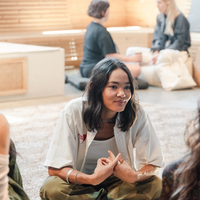It’s 9 p.m. You’re in bed. You’ve moved from the big internet (your computer) to the little internet (your phone). You know you should turn it off and go to sleep, but you won’t.
Or maybe you can’t?
Social media and smartphones are constantly on the brain. A 2012 Purdue University study found 89 percent of undergraduate students experience “phantom vibrations” from a silent or powered-off device. Meanwhile, another study found that 38 percent of adults believe social media usage harms mental health and two-thirds agree that social media usage relates directly to feelings of loneliness and social isolation.
“When we use social media as a tool to connect, we are more likely to feel fulfilled and satisfied,” says licensed clinical social worker (LCSW) and psychotherapist Kara Lissy. “But when it starts becoming a means of comparison or a way to zone out from our feelings, it can actually deplete us of energy and resources.”
Are you trying to cut down on your social media use? Do you want to unplug completely? Or win a bet with your friends, because these are the type of social interactions you’ve been reduced to during the COVID-19 pandemic?
Whatever your end goal, here are some therapist-approved tips to stop your scrolling—or at least slow it down.
Be honest: How do you really use social media?
“The first part in identifying healthy cell phone and social media use is determining how you're using it,” says Lissy, “and whether or not you’re using it in that way is serving you.”
San Franciscan model and snake enthusiast Megan Doak finds herself using social media when she feels stressed.
“When I think about the things I need to do, I get overwhelmed and look at my phone as a distraction, but it just doesn’t feel good,” Doak says, recalling how she used this strategy last year while struggling to finish her taxes.
Eventually, Doak realized her constant phone usage was taking a physical toll on her eyes and wrist. She began wearing a wrist brace to alleviate the strain.
Some, like Alex Bassaj in San Diego, consider social media “a necessary evil.” As a graphic designer and the bassist for the band Warish, Bassaj uses social media for promotion or to showcase work.
“Promotion is ultimately my aim,” he says. “Whether it be for art, band stuff, or any number of my side hustles—if I don't post it, it doesn't exist to most people.”
Whatever you use technology for, it’s important to be honest about your usage and whether or not it’s interfering with your life. Admitting to a problem is the first step.
Be mindful when you scroll.
“Another way to think about healthy use is to think about mindful use,” Lissy suggests. “Are you engaging with the content you're consuming? Or are you mindlessly scrolling to the point where one post is blending into the next?”
Psychotherapist Haley Neidich, LCSW, agrees, adding, “Mindless social media scrolling on your phone sucks up a lot of time, can worsen self-esteem and even increase symptoms of depression and anxiety.”
Doomscrolling, as defined by the Cleveland Clinic, is “the act of continuously scrolling through social media or surfing the web and taking in a constant torrent of bad news.” Although it wasn’t unheard of before 2020, let’s just say the past year has cemented the term’s everyday usage. But is there any way to stop ourselves from succumbing to the call of the void?
Setting a designated amount of time for social media use is one way to stay mindful. That way, when you’re logged on, you’re conscious of what you’re doing and for how long instead of embracing the nihilism of a never-ending feed.
“I probably spend an average of 10-to-20 minutes perusing Instagram before and/or after I post something,” Bassaj notes. “I've deactivated all notifications. I use it when I want to, not when it urges me to.”
Neidich’s top tips for limiting use are:
- No social media after 8 p.m.
- One 24-hour period weekly with no social media use at all.
- Keep your phone in another room when you go to bed to start your day fresh without your phone in hand. Use an old-school alarm clock!
Find a replacement activity.
Many people default to grabbing their phone, intentionally or not, whenever they have a spare moment.
“I have a lot of time to myself during the week and just kind of gravitate toward my phone,” says Doak.
And she isn’t an anomaly. According to Lissy, “We often use social media to disconnect from ourselves without knowing it.”
To combat this, Neidich advises replacing your phone use with another activity—one you’re deliberately choosing to do. “The people who are most successful with this,” she says, “are the people replacing that time with something they love.”
Remember books? You may even have a few. Try grabbing one of those next time you want to grab your phone. See what it feels like to ignore your loved ones because of print media instead of a screen for once.
Use an app to limit your screen time—or something more drastic.
Monitoring your screen time manually can range anywhere from cumbersome to downright impossible. Lissy recommends bringing tech into the endeavor. Applications such as Screen Time for the iPhone give different selections for different goals.
“This allows you to still get the benefits of your phone's entertainment without the long period of disruption in your day,” Lissy explains.
Neidich suggests going a step further and comparing your cell phone use to your mood with a tracking app to observe trends. “Most people will report that the more time they spent on their phones, the more down or anxious they were that week,” she says.
Meanwhile, Doak, struggling to limit her time and finding apps ineffective, started letting her partner hide her cell phone before he went to work for the day. When she does use her phone after her partner returns home, she feels she is “able to look at [social media] more intentionally.”
Be gentle with yourself.
Remember, cutting down is a process and can take time.
“People often do not meet their goals for limiting screen time because they set rigid, unrealistic expectations for themselves,” notes Lissy. “Success is most likely when we view it through a self-compassionate lens rather than a self-critical or judgmental one.”
Set a timer whenever you hop on social media to ensure you aren’t accidentally running over. If you forget, or decide to snooze your alarm, simply smash your hand in a door as punishment. Actually, scratch that—negative reinforcement isn’t necessary. Instead, give yourself a treat when you put your phone away. Pairing the action with a reward incentivizes you to keep putting the phone away and will help speed up that habit formation timeline.
Reframing social media as a tool with a specific purpose and only using it for that purpose is a great start, but don’t beat yourself up if it takes longer than you expected. Keep reminding yourself of the bigger picture.
“With social media, you have all of these memes and pictures of your friends that you love,” says Doak, “but what is it actually for?”




